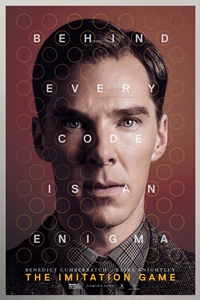 The Imitation Game
The Imitation Game
Starring Benedict Cumberbatch, Keira Knightley, Matthew Good, Charles Dance and Mark Strong
Direct by Morten Tyldum
From The Weinstein Company
Rated PG-13
114 minutes
by Michael Clawson of Terminal Volume
In 1952, the man who shaved two years and millions of deaths off of World War II was prosecuted for a crime so frivolous and embarrassing that the Queen would have to pardon him decades later. But by then the damage had been done in this shameful piece of history.
Alan Turing, the subject of The Imitation Game, was instrumental in the events of World War II, he synthesized a number of modern ideas about artificial intelligence, and he pioneered this great big box that would one day become the computer. But Turing was also gay, something he was punished for with reprehensible cruelty after the war. I wanted Imitation Game to be as outraged as I was, but it takes a different approach entirely: it presents Turing not as a victim, but a hero.
Turing (Benedict Cumberbatch) was plucked from the ranks of a very talented batch of science geeks at Cambridge during the onset of World War II. He was assigned to Bletchley Park, the secret British codebreaking campus that was just starting to wrap its collective brain around the Nazi’s ellusive Enigma machine.
Morten Tyldum’s careful direction and Graham Moore’s determined script present Enigma as a character in the film. The German code machine looks like a typewriter, but with a lampboard, a set of rotors, and a plugboard behind a wood panel at the base. The permutations of possible codes was almost incalculable — “millions of millions” one codebreaker says. Making matters worse, the Germans changed the machine’s codes daily, which gives the codebreakers roughly 18 hours of tinkering once the coded messages were gathered from the battlefield. While the others workers tried different combinations of plugs and rotors, Turing was looking for a shortcut.
The Imitation Game plays like an espionage thriller, because it is. In fact, historically speaking, it is the ultimate spy thriller. Turing, who was an awkward loner, spends much of the movie hunched over electronic components, dodging double-agent accusations, smuggling documents out of Bletchley Park to study at home, and fighting with his co-workers who didn’t share his ideas about his computing box that he called Christopher. Turing slogged through them, his subordinates (including Charles Dance and Mark Strong) and even Winston Churchill to get Christopher up and working with astounding results.
In one of the film’s strongest segments, Turing needs to hire more codebreakers so he plants a difficult crossword puzzle in the newspaper and watches as bewildered readers show up saying they can solve it. He ends up hiring the only woman, Joan Clarke (Keira Knightley), who falls for Turing even amid her suspicions of his orientation. They make a great pair.
I’m skeptical of historical movies like this, because I know they condense facts, eliminate characters, make composites of others and in the end the history is lost. That is certainly true here, especially once you start diving into the details of Turing’s machine and Enigma’s follow-up project, Ultra. But the core here is Turing, and he’s just fascinating. As is Cumberbatch, who is just delightful in everything he’s in.
I left Imitation Game fuming at Turing’s treatment after the war, but also immensely proud of his work during the war. If only he would have been allowed to continue working — the world might look a little different today.









